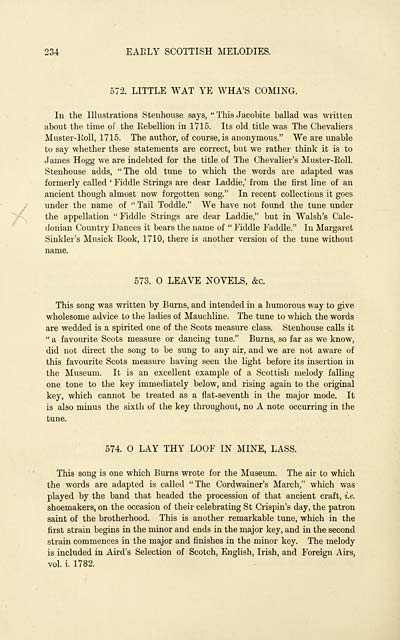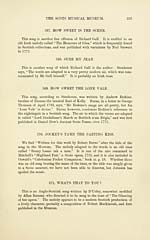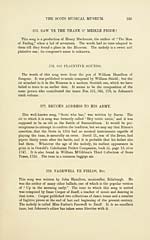Inglis Collection of printed music > Printed text > Early Scottish melodies
(256) Page 234 - Little wat ye wha's coming
Download files
Complete book:
Individual page:
Thumbnail gallery: Grid view | List view

234 EAELY SCOTTISH MELODIES.
572. LITTLE WAT YE WHA'S COMING.
In the Illustrations Stenhonse says, " This Jacobite ballad was written
about the time of the Eebellion in 1715. Its old title was The Chevaliers
Muster-Eoll, 1715. The author, of course, is anonymous." "We are unable
to say whether these statements are correct, but we rather think it is to
James Hogg we are indebted for the title of The Chevalier's Muster-Eoll.
Stenhouse adds, "The old tune to which the words are adapted was
formerly called ' Fiddle Strings are dear Laddie,' from the first line of an
ancient though almost now forgotten song." In recent collections it goes
under the name of " Tail Toddle." We have not found the tune under
the appellation " Fiddle Strings are dear Laddie," but in Walsh's Cale-
donian Country Dances it bears the name of " Fiddle Faddle." In Margaret
Sinkler's Musick Book, 1710, there is another version of the tune without
name.
573. LEAVE NOVELS, &c.
This song was written by Burns, and intended in a humorous way to give
wholesome advice to the ladies of Mauchline. The tune to which the words
are wedded is a spirited one of the Scots measure class. Stenhouse calls it
" a favourite Scots measure or dancing tune." Burns, so far as we know,
did not direct the song to be sung to any air, and we are not aware of
this favourite Scots measure having seen the light before its insertion in
the Museum. It is an excellent example of a Scottish melody falling
one tone to the key immediately below, and rising again to the original
key, which cannot be treated as a flat-seventh in the major mode. It
is also minus the sixth of the key throughout, no A note occurring in the
tune.
574. LAY THY LOOF IN MINE, LASS.
This song is one which Burns wrote for the Museum. The air to which
the words are adapted is called "The Cordwainer's March," which was
played by the band that headed the procession of that ancient craft, i.e.
shoemakers, on the occasion of their celebrating St Crispin's day, the patron
saint of the brotherhood. This is another remarkable tune, which in the
first strain begins in the minor and ends in the major key, and in the second
strain commences in the major and finishes in the minor key. The melody
is included in Aird's Selection of Scotch, English, Irish, and Foreign Airs,
vol. i. 1782.
572. LITTLE WAT YE WHA'S COMING.
In the Illustrations Stenhonse says, " This Jacobite ballad was written
about the time of the Eebellion in 1715. Its old title was The Chevaliers
Muster-Eoll, 1715. The author, of course, is anonymous." "We are unable
to say whether these statements are correct, but we rather think it is to
James Hogg we are indebted for the title of The Chevalier's Muster-Eoll.
Stenhouse adds, "The old tune to which the words are adapted was
formerly called ' Fiddle Strings are dear Laddie,' from the first line of an
ancient though almost now forgotten song." In recent collections it goes
under the name of " Tail Toddle." We have not found the tune under
the appellation " Fiddle Strings are dear Laddie," but in Walsh's Cale-
donian Country Dances it bears the name of " Fiddle Faddle." In Margaret
Sinkler's Musick Book, 1710, there is another version of the tune without
name.
573. LEAVE NOVELS, &c.
This song was written by Burns, and intended in a humorous way to give
wholesome advice to the ladies of Mauchline. The tune to which the words
are wedded is a spirited one of the Scots measure class. Stenhouse calls it
" a favourite Scots measure or dancing tune." Burns, so far as we know,
did not direct the song to be sung to any air, and we are not aware of
this favourite Scots measure having seen the light before its insertion in
the Museum. It is an excellent example of a Scottish melody falling
one tone to the key immediately below, and rising again to the original
key, which cannot be treated as a flat-seventh in the major mode. It
is also minus the sixth of the key throughout, no A note occurring in the
tune.
574. LAY THY LOOF IN MINE, LASS.
This song is one which Burns wrote for the Museum. The air to which
the words are adapted is called "The Cordwainer's March," which was
played by the band that headed the procession of that ancient craft, i.e.
shoemakers, on the occasion of their celebrating St Crispin's day, the patron
saint of the brotherhood. This is another remarkable tune, which in the
first strain begins in the minor and ends in the major key, and in the second
strain commences in the major and finishes in the minor key. The melody
is included in Aird's Selection of Scotch, English, Irish, and Foreign Airs,
vol. i. 1782.
Set display mode to: Large image | Transcription
Images and transcriptions on this page, including medium image downloads, may be used under the Creative Commons Attribution 4.0 International Licence unless otherwise stated. ![]()
| Special collections of printed music > Inglis Collection of printed music > Printed text > Early Scottish melodies > (256) Page 234 - Little wat ye wha's coming |
|---|
| Permanent URL | https://digital.nls.uk/94646344 |
|---|---|
| Description | Also: O leave novels. Also: O lay thy loof in mine, lass. |
| Description | Scottish and English songs, military music and keyboard music of the 18th and 19th centuries. These items are from the collection of Alexander Wood Inglis of Glencorse (1854 to 1929). Also includes a few manuscripts, some treatises and other books on the subject. |
|---|
| Description | The Glen Collection and the Inglis Collection represent mainly 18th and 19th century Scottish music, including Scottish songs. The collections of Berlioz and Verdi collected by bibliographer Cecil Hopkinson contain contemporary and later editions of the works of the two composers Berlioz and Verdi. |
|---|

